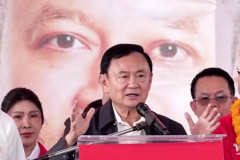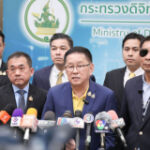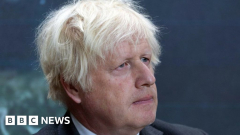Thaksin: On the campaign trail
The government’s own inner workings could turn out to be more disruptive to its unity than external forces or even the opposition, according to a political analyst.
Particularly, how astutely the ruling Pheu Thai Party manages its relationship with its two biggest conservative coalition partners — the Bhumjaithai and United Thai Nation (UTN) parties — is central to overall harmony in government.
Despite the opposition’s threat to soon file a no-confidence motion — its most potent tool — against the Paetongtarn Shinawatra administration, several observers reckon it would be unlikely to sink the government, regardless of the impact it might generate.
A plausible explanation boils down to the “super deal” Pheu Thai and conservative parties reportedly clinched during the formation of the first Pheu Thai-led administration in 2023, headed by Srettha Thavisin.
The deal, thought to have been brokered by former premier Thaksin Shinawatra — who wields considerable influence over Pheu Thai — was allegedly struck some time before Pheu Thai ditched the then Move Forward Party (MFP) and opted instead to form a government with the conservative camp.
Pheu Thai subsequently became known as a “neo-conservative” party tasked with leading the right-wing bloc in fending off the rapidly expanding MFP, now dissolved and reborn as the People’s Party.
The source said that even though the Pheu Thai-led government, now headed by Ms Paetongtarn, appears to have embraced conservatism, the “marriage of convenience” with the right-wing parties is anything but congenial.
Pheu Thai may be a Bhumjaithai and UTN ally, however, there have been times when the ruling party has found the two parties a thorn in its side.
The source said there is a constant, covert competition between the three parties.
After all, political parties naturally need to plan for future elections and faring well in polls means inevitably tapping into the support base of allies.
Pheu Thai and Bhumjaithai have enjoyed a bit of a love-hate relationship. In elections, the two parties are in stiff competition in many places, mostly in the constituency-rich Northeast where Pheu Thai previously held sway in the upper region and Bhumjaithai in the lower part. But they suffered a huge setback in the 2023 general election with the MFP having made substantial inroads in their territories.
Pheu Thai, assisted by Thaksin, has been trying to recapture lost ground through its bid to resurrect red-shirt support. In the process, the party will also look to expand into constituencies controlled by Bhumjaithai.
A visible sign of a rift between Pheu Thai and its conservative partners came when Thaksin accused some coalition parties of not being team players, citing the absence of their ministers from a cabinet meeting on Dec 11 last year, when two executive decrees were on the agenda.
Thaksin said during a seminar in Hua Hin on Dec 13 that the parties should leave the government if they were half-hearted about staying on.
Among the cabinet ministers missing from the Dec 11 meeting were Energy Minister and UTN Party leader Pirapan Salirathavibhaga and Deputy Agriculture Minister Akkhara Prompow from a breakaway faction formerly with the Palang Pracharath Party.
Interior Minister and Bhumjaithai Party leader Anutin Charnvirakul had to cut short a doctor’s appointment to attend the meeting after receiving a call from PM’s secretary-general Prommin Lertsuriyadej.
Thaksin’s reaction, according to the source, could well be construed as Pheu Thai’s stand toward its coalition partners.
They have more or less ignored Thaksin’s remark.
The former prime minister recently fired a fresh broadside, this time directly at Bhumjaithai. He
Read More





